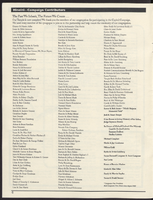Search the Special Collections and Archives Portal
Search Results
Ronzone Family Papers
Identifier
Abstract
Ronzone Family Papers (1900-1991) include newspaper clippings, business documents, correspondence, certificates, yearbooks, publications, artifacts, and photographs. The papers document their lives in Nevada, their department store, and Dick Ronzone's involvement in local politics.
Archival Collection
Fallman Family Papers
Identifier
Abstract
The Fallman Family Papers (approximately 1950-2005) consist of correspondence, newspaper clippings, photographic prints and slides, scrapbooks, and pamphlets from James and Ima Fallman and their daughter, Janice. The correspondence primarily relates to James and Ima Fallman and chronicles Ima's involvement with the Francisco Garces chapter of the Daughters of the American Revolution (DAR), James's work as a bartender in Las Vegas, Nevada, and awards he received during World War II. The newspaper clippings mention either James Fallman or his daughter, Janice, and her involvement with the Las Vegas High School Rhythmettes dance team. The majority of materials from Janice describe her school days at Las Vegas High School and events participated in as a child and young adult.
Archival Collection

Transcript of interview with Robert & Patricia Campbell by Stefani Evans, November 28, 2017 & March 1, 2018
Date
Archival Collection
Description
In 1976, when Bob Campbell accepted the city manager position in Henderson, Nevada, he and his family had just endured nearly a month of sub-zero temperatures in their native Missouri. Southern Nevada's mild winter coupled with the promise of developing the 8,600 acres that would become Green Valley convinced Bob and his wife, Pat, to make the move. Bob came to Henderson with a degree in public administration and city manager experience in two Missouri towns, but Green Valley offered something akin to "an artist having a blank canvas on which to plan and create." In this interview, Bob talks about the ways his career in public administration blossomed in Southern Nevada. After about five years with the City of Henderson, Campbell joined Mark Fine and American Nevada Corporation to develop Green Valley; five years after that, he moved to Southwest Gas Corporation to work with Bill Laub and later, Kenny Guinn. From about 1989 to 1997, he helped develop Lake Las Vegas. In 1994, Bob and Pat together formed The Campbell Company, a private consulting firm whose clients included Transcontinental Properties' Lake Las Vegas project as well as Henry Chen's Ascaya. v Much of the interview focuses on the Lake Las Vegas project: its original visionary, false starts, and its tumultuous development as an arm of the Bass brothers of Fort Worth, Texas; their developer, Ronald Boeddeker of Transcontinental Properties in Santa Barbara, California, and Boeddeker's appointee, Alton Jones. Along the way Campbell shares the strategies employed by the Wednesday morning group of Henderson boosters who met at Saint Peter's Catholic Church and who succeeded in gaining the necessary local, state, and federal approvals to move the project forward. He reveals the intimidation, physical threats, and sexual harassment suffered by those who questioned the way Jones did business. Overall, though, he explains why he continues to respect the Bass brothers and is still proud of Lake Las Vegas, "proud that we got it on, and proud that it's turned out to be what it is."
Text

Transcript of interview with Tom Wright by Claytee White, February 14, 2005
Date
Archival Collection
Description
Dr. Tom Wright was born and grew up in Illinois. His father finished his PhD in Chicago and then taught at Illinois College in Jacksonville. His mother suffered from arthritis and was told to seek a warmer climate, so John Wright packed up his family and moved to Las Vegas. Tom was 14, ready for high school, and his two brothers were elementary school age. Tom attended Las Vegas High School, which was close to the Crestwood community where the family had purchased their first home. He remembers that UNLV had no buildings when his dad first started teaching there. Instead, he conducted class in high school classrooms and church Sunday school rooms. Dr. Wright started off at a community college as a Geology Major, but a class with Bud Poland convinced him that history was his passion. He transferred to Pomona to continue his bachelor's degree. He spent his junior year in Peru on a study-abroad program, and that experience made him a Latin Americanist. The information he gath
Text

Jessica Hutchings oral history interview: transcript
Date
Archival Collection
Description
Oral history interview with Jessica Hutchings conducted by Barbara Tabach on March 21, 2018 for the Remembering 1 October Oral History Project. In this interview, Jessica Hutchings discusses her experience flying to Las Vegas, Nevada on the night of the October 1, 2017 mass shooting. She speaks of her flight's detour to Phoenix, Arizona, and her discovery of the shooting. Hutchings explains how Congregation Ner Tamid, where she is a cantor, contributed to the community healing after the tragedy, including their organization of vigils, a music fundraiser called "Vegas Strong in Song," and discussing the event with teenage Hebrew School students who had questions and concerns about the shooting.
Text

Kochy Tang oral history interview: transcript
Date
Archival Collection
Description
Oral history interview with Kochy Tang conducted by Kristel Peralta, Vanessa Concepcion, and Stefani Evans on May 26, 2021 for Reflections: The Las Vegas Asian American and Pacific Islander Oral History Project. Kochy gives a family history of her parents and how they both came to practice medicine; her father served in a Mobile Army Surgical Hospital during the Korean War and later practiced alternative medicine alongside Kochy's mother in San Francisco and Reno. Kochy shares her educational and employment path pursuing osteopathic medicine and how, with the help of Tony Marnell, she was able to open her pratice within the M Resort and Casino. She discusses her work as a Doctor of Osteopathy (D.O.) and the relationships she has built within the Las Vegas medical community.
Text

Transcript of interview with Richard Steele and Zakeisha Steele-Jones by Claytee White, February 12, 2015
Date
Archival Collection
Description
Richard Steele became interested in professional boxing at a young age when he was introduced to world champion boxers Chalky Wright and Sugar Ray Robinson. He trained at Hoover Street Gym in South Central, Los Angeles, with trainer Eddie Futch. Richard joined and boxed for the United States Marine Corps and became Marine Corps Middleweight Champion in 1963. Born in Kansas City, Missouri in 1944 Richard and his family moved to Los Angeles, California in the early 1950s. His father was a bartender and his mother was an elevator operator. During the interview Richard’s daughter Zakeisha Steele-Jones discusses the various job titles her father has held, including professional actor and campus police officer. Most notably, Richard was the second Black professional referee in both Los Angeles, California, and Las Vegas, Nevada. A profound interview heralding key character traits, such as, perseverance, resilience, strength, and determination, Richard recalls being personally invited by Nelson Mandela to referee the WBC Convention in South Africa. Some of Richard’s most memorable title fights to date include, the Hearns and Hagler fight, Sugar Ray Leonard and Tommy Hearns, and four Mike Tyson fights. Zakeisha also interjects that her father currently manages and owns a boxing gym where he trains and mentors young Black and Hispanic aspiring boxing champions and referees.
Text


